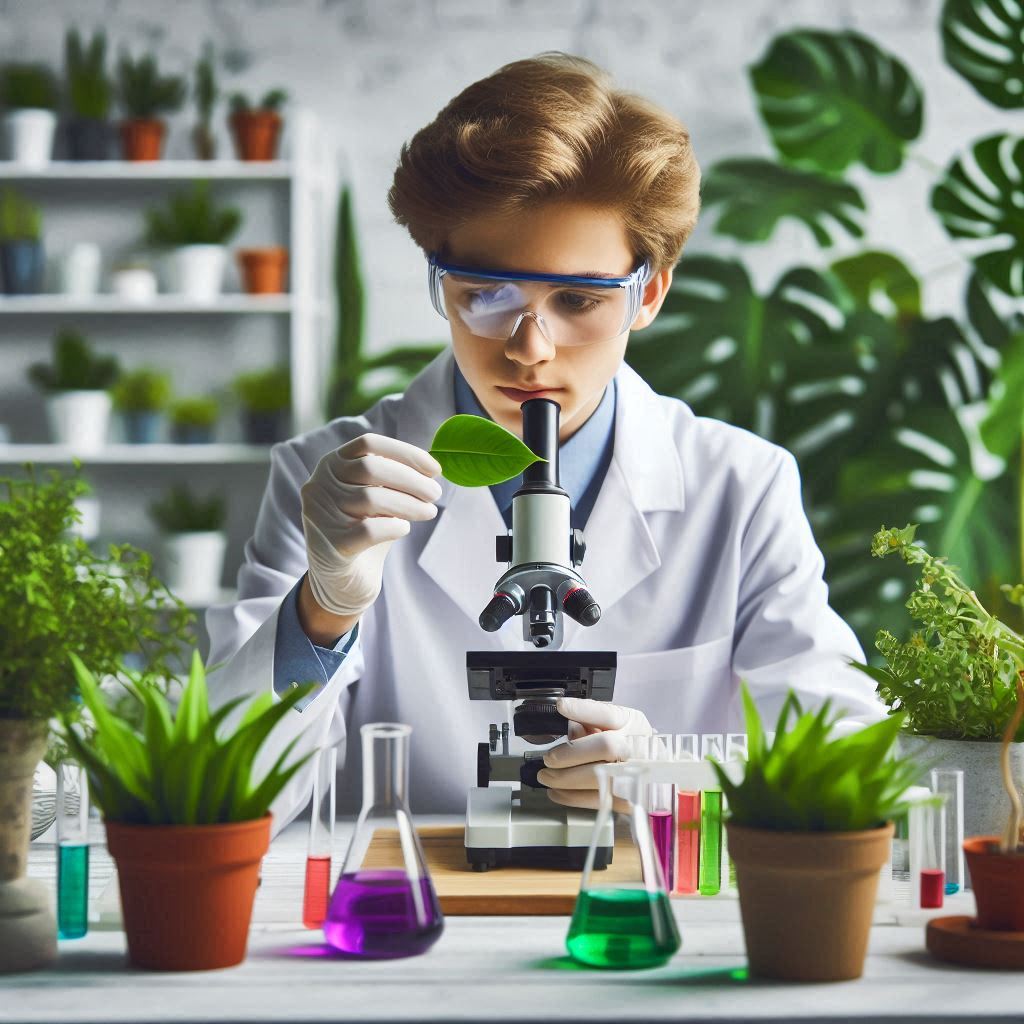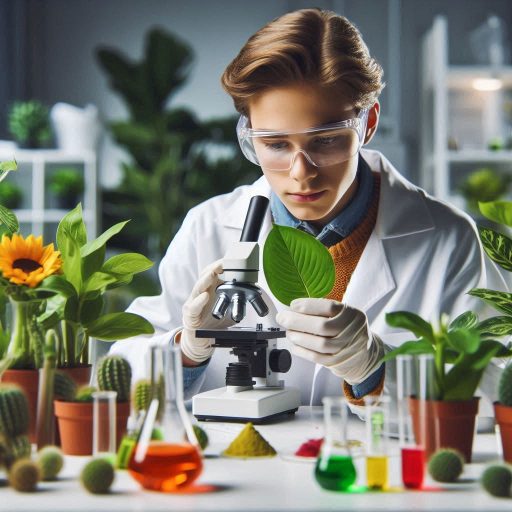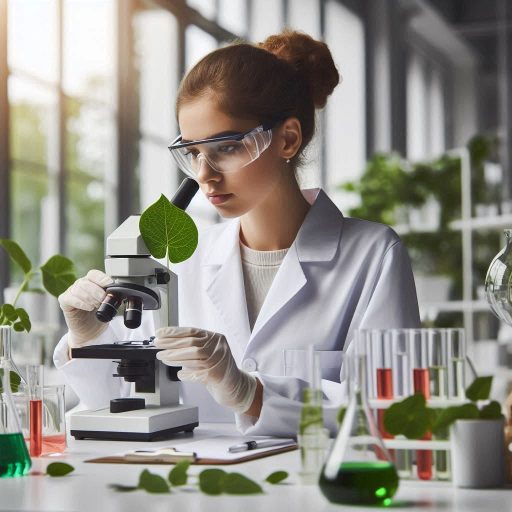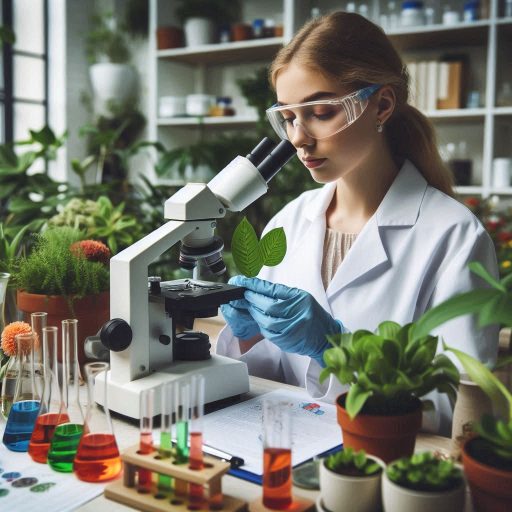Introduction
Plant science research in the USA plays a vital role in addressing global challenges.
This research focuses on improving crop yield, sustainability, and environmental resilience.
Research labs drive innovation in agricultural practices and plant biology.
They explore genetic engineering, pest resistance, and climate adaptability.
The importance of these labs cannot be overstated.
They generate valuable knowledge that enhances food security and supports sustainable agriculture.
Additionally, they provide training for future scientists, ensuring ongoing advancements in the field.
Collaboration among labs, universities, and industries fosters groundbreaking discoveries that benefit society.
In this blog post, we will highlight the top plant science research labs in the USA.
These labs have made significant contributions to the field through their innovative research and partnerships.
They address pressing issues, such as climate change and food scarcity, and offer solutions that benefit farmers and consumers alike.
By showcasing these institutions, we aim to underscore their role in shaping the future of plant science.
Through continued research and collaboration, these labs will help ensure a sustainable and secure food supply for generations to come.
University of California, Davis
Overview of Research Conducted at the Lab
The University of California, Davis (UC Davis) stands as a leader in plant science research.
This institution is renowned for its comprehensive programs that focus on various aspects of plant biology, agriculture, and environmental sciences.
Researchers at UC Davis explore sustainable agricultural practices, plant genetics, and crop improvement.
Their work significantly contributes to enhancing food security and environmental sustainability.
UC Davis houses several research centers dedicated to plant science.
The Plant Sciences Department conducts cutting-edge research on crop physiology, plant genetics, and pest management.
Additionally, the university operates the Agricultural Sustainability Institute, which promotes sustainable farming practices and research.
Notable Achievements and Discoveries
One notable achievement of UC Davis is its role in developing disease-resistant grapevines.
Researchers identified genetic traits that enhance resistance to powdery mildew.
This discovery significantly improved the health and yield of grape crops.
Moreover, UC Davis played a pivotal role in developing new tomato varieties that thrive in diverse climates.
These advancements help farmers increase productivity and adapt to changing environmental conditions.
Collaboration with Other Institutions
The university’s collaborative efforts further strengthen its research impact.
UC Davis partners with various institutions, including the USDA Agricultural Research Service and international research organizations.
These collaborations foster knowledge exchange and resource sharing, amplifying research outcomes.
For example, UC Davis collaborates with the International Rice Research Institute to enhance rice production in Asia.
Moreover, UC Davis engages in interdisciplinary research, integrating plant science with other fields like climate science and engineering.
This approach fosters innovation and encourages comprehensive solutions to agricultural challenges.
Researchers often work alongside engineers and environmental scientists to develop sustainable technologies for agriculture.
UC Davis also emphasizes student involvement in research.
Undergraduate and graduate students actively participate in research projects, gaining hands-on experience in plant science.
This involvement cultivates the next generation of plant scientists, equipping them with essential skills for their careers.
Additionally, UC Davis hosts workshops, seminars, and conferences to disseminate research findings.
These events promote dialogue among researchers, policymakers, and industry professionals.
They also provide a platform for discussing current challenges and future trends in plant science.
The University of California, Davis, remains a top plant science research lab in the USA.
Its commitment to innovative research, notable achievements, and collaborative efforts significantly impact the field.
By advancing knowledge in plant science, UC Davis contributes to sustainable agriculture and food security, shaping the future of global agriculture.
Read: Challenges and Rewards: The Dual Life of an U.S. Environmental Scientist
USDA Agricultural Research Service
Focus on Plant Genetics and Breeding
The USDA Agricultural Research Service (ARS) plays a crucial role in advancing plant genetics and breeding.
This agency conducts innovative research aimed at improving crop varieties and enhancing agricultural practices.
Researchers at ARS focus on developing disease-resistant and high-yield crops.
Their work addresses the growing demands for food production amid changing environmental conditions.
ARS researchers utilize cutting-edge technologies in plant genetics.
They employ genomic sequencing to identify beneficial traits in plants.
These traits can enhance crop resilience to pests, diseases, and climate stressors.
By leveraging genetic information, ARS scientists can develop improved crop varieties faster and more efficiently.
Impact on Agriculture and Food Security
The impact of ARS research on agriculture and food security is significant.
Their advancements contribute to increased crop yields, benefiting farmers and consumers alike.
By creating resilient crop varieties, ARS helps ensure food availability and affordability.
This is vital in a world facing population growth and climate change challenges.
For example, ARS has developed new wheat and barley varieties that resist prevalent diseases.
These innovations protect farmers‘ investments and promote sustainable farming practices.
Additionally, ARS research on drought-resistant crops helps farmers cope with water scarcity.
These initiatives support both agricultural productivity and environmental conservation.
ARS also emphasizes the importance of sustainable agricultural practices.
Researchers develop techniques that minimize environmental impacts while maximizing productivity.
This includes promoting integrated pest management and soil health practices.
By doing so, ARS contributes to long-term sustainability in food production.
International Collaborations and Partnerships
International collaborations and partnerships enhance ARS’s research efforts.
The agency works with various organizations and institutions worldwide.
These partnerships foster knowledge exchange and collaborative research initiatives.
For instance, ARS collaborates with international agricultural research centers to address global food security challenges.
Through collaborations, ARS shares its expertise in plant genetics and breeding.
In return, it gains access to diverse genetic resources from other countries.
This exchange accelerates the development of improved crop varieties suited for different environments.
ARS also participates in global research projects addressing climate change and agriculture.
These projects focus on developing strategies for adapting crops to changing climatic conditions.
By collaborating internationally, ARS helps ensure that research benefits are shared globally.
Moreover, ARS engages with industry partners to translate research findings into practical applications.
This partnership enhances the adoption of innovative agricultural practices among farmers.
By working together, ARS and industry stakeholders promote the development and dissemination of new technologies.
The USDA Agricultural Research Service significantly impacts plant genetics and breeding.
Its focus on sustainable agriculture and food security addresses critical challenges in the field.
Through international collaborations, ARS fosters innovation and knowledge sharing, shaping the future of agriculture.
By investing in research and development, ARS helps secure a sustainable food supply for future generations.
Read: Job Market Trends: Future of Chemistry Jobs in America
Boyce Thompson Institute
Cutting-Edge Research in Plant Biology
The Boyce Thompson Institute (BTI) is renowned for its cutting-edge research in plant biology.
Located in Ithaca, New York, BTI conducts innovative studies on plant genomes and their functions.
Researchers at BTI focus on understanding the molecular mechanisms that underpin plant growth and development.
They explore how plants interact with their environment, including other organisms.
One of BTI‘s significant research areas is plant-microbe interactions.
Scientists investigate how beneficial microbes affect plant health and resilience.
This research aims to develop sustainable strategies for enhancing crop productivity.
Researchers also study plant responses to environmental stresses such as drought and salinity.
By understanding these processes, BTI contributes to creating crops that can thrive in challenging conditions.
Emphasis on Sustainable Agriculture
Sustainable agriculture is a core emphasis at the Boyce Thompson Institute.
Researchers aim to develop practices that enhance crop production while minimizing environmental impacts.
BTI explores genetic solutions for sustainable agriculture, focusing on improving resource efficiency.
This includes enhancing water use efficiency and reducing fertilizer dependence.
BTI collaborates with agricultural stakeholders to translate research findings into practical applications.
These collaborations aim to implement sustainable practices that benefit farmers and the environment.
The institute also addresses food security challenges by developing resilient crop varieties.
By focusing on sustainability, BTI helps promote long-term agricultural viability.
The institute‘s research efforts extend to developing biopesticides and biofertilizers.
These sustainable alternatives to chemical inputs can improve crop health without harming ecosystems.
BTI‘s commitment to sustainable agriculture aligns with global efforts to combat climate change and protect natural resources.
Training and Support for Young Researchers
The Boyce Thompson Institute prioritizes training and support for young researchers in plant science.
BTI offers a vibrant academic environment that fosters innovation and collaboration.
Graduate students and postdoctoral researchers gain hands-on experience in advanced research techniques.
They work alongside leading scientists on cutting-edge projects, enhancing their skills and knowledge.
BTI provides mentorship opportunities for emerging scientists.
Experienced researchers guide young professionals, helping them navigate their careers in plant science.
This mentorship fosters a culture of learning and growth within the institute.
Young researchers benefit from networking opportunities and exposure to various research areas.
In addition to mentorship, BTI offers workshops and seminars.
These events cover a range of topics, including research methodologies and career development.
By participating in these activities, young researchers stay updated on the latest advancements in plant science.
BTI also collaborates with other institutions to enhance training programs.
These partnerships provide additional resources and expertise for young researchers.
Collaborative projects allow them to engage with a broader scientific community.
The Boyce Thompson Institute stands at the forefront of plant biology research.
Its commitment to sustainable agriculture addresses critical challenges in food production.
By providing training and support for young researchers, BTI cultivates the next generation of plant scientists.
Through innovative research and collaboration, the institute continues to impact plant science and sustainable agriculture significantly.
Read: Challenges and Rewards: Navigating the Chemist Career Path

Carnegie Institution for Science
Research on Plant Development and Evolution
The Carnegie Institution for Science is a leading research organization focusing on plant development and evolution.
Located in Stanford, California, the institution houses the Department of Plant Biology.
Researchers here study the genetic and molecular mechanisms that drive plant growth and development.
Their work contributes to understanding how plants adapt to their environments over time.
Scientists at Carnegie investigate various aspects of plant biology.
They examine how plants respond to environmental signals, such as light and gravity.
Researchers use advanced technologies to study plant cell biology and development.
They also explore the evolution of plant species and their ecological interactions.
This research helps scientists understand the diversity of plant life on Earth.
Contributions to Understanding Climate Change Impacts on Plants
The Carnegie Institution actively investigates how climate change impacts plant life.
Researchers assess how rising temperatures and changing precipitation patterns affect plant growth and distribution.
They study the physiological responses of plants to increased carbon dioxide levels.
This research helps predict how plants may adapt or decline in a changing climate.
The institution’s studies also examine plant resilience and adaptation strategies.
By understanding these mechanisms, scientists can identify species that may thrive under climate change.
This research is crucial for developing conservation strategies and managing ecosystems effectively.
Carnegie‘s work informs policymakers and land managers about potential impacts on biodiversity.
Funding and Grants for Plant Science Projects
The Carnegie Institution for Science supports various plant science projects through funding and grants.
It offers financial assistance to researchers aiming to explore innovative ideas in plant biology.
These grants enable scientists to conduct cutting-edge research and advance their understanding of plants.
Carnegie collaborates with other institutions and organizations to promote plant science.
These partnerships often result in joint funding opportunities for impactful research.
The institution actively seeks collaborations that enhance the scientific community’s collective knowledge.
In addition to funding, Carnegie provides resources and infrastructure for researchers.
This includes access to state-of-the-art laboratories and research facilities.
Such resources facilitate high-quality research and promote scientific excellence.
Furthermore, the Carnegie Institution emphasizes training the next generation of scientists.
It offers mentorship and support to students and early-career researchers.
This commitment helps cultivate future leaders in plant science, ensuring the field‘s continued growth.
The institution’s focus on plant development, climate change, and funding exemplifies its dedication to advancing plant science.
Through its research, Carnegie contributes to a deeper understanding of plant biology and evolution.
The insights gained from this work are vital for addressing global challenges, such as climate change and food security.
The Carnegie Institution for Science plays a pivotal role in advancing plant research.
Its contributions to understanding plant development and climate change impacts are significant.
Through funding and support, Carnegie fosters innovation and collaboration in plant science.
This work will continue to shape our understanding of plants and their role in the ecosystem.
Read: Diverse Career Paths: From Chemist to Patent Attorney in the US
Uncover the Details: Postdoctoral Opportunities in Nuclear Science
Explore Further: Climatologist vs Meteorologist: Key Differences
University of Illinois at Urbana-Champaign
Interdisciplinary Approach to Plant Research
The University of Illinois at Urbana-Champaign (UIUC) is renowned for its interdisciplinary approach to plant science research.
Researchers at UIUC combine expertise from various fields, including genetics, ecology, and agronomy.
This collaboration fosters innovation and promotes comprehensive understanding of plant biology.
The university emphasizes solving complex challenges related to food production and environmental sustainability.
Faculty members engage in diverse research projects.
These projects address critical issues like crop yield improvement and pest resistance.
Researchers utilize advanced technologies such as genomics and bioinformatics.
This enables them to analyze plant traits and develop more resilient crop varieties.
The interdisciplinary approach enhances the quality and impact of research conducted at UIUC.
Transform Your Career Today
Unlock a personalized career strategy that drives real results. Get tailored advice and a roadmap designed just for you.
Start NowPartnerships with Industry and Government Agencies
UIUC actively partners with industry and government agencies to enhance plant science research.
These collaborations bring together academic knowledge and practical applications.
By working with agricultural companies, researchers gain insights into industry needs and challenges.
This ensures that research outcomes are relevant and applicable to real-world situations.
The university‘s partnerships extend to government organizations, promoting research that informs public policy.
These collaborations often focus on sustainable agriculture and food security.
By leveraging resources and expertise, UIUC researchers can tackle pressing agricultural issues effectively.
Outreach Programs for Farmers and Educators
The University of Illinois at Urbana-Champaign also prioritizes outreach programs for farmers and educators.
These initiatives aim to disseminate research findings and promote sustainable practices.
The university provides workshops, seminars, and educational resources to support agricultural professionals.
Farmers benefit from the latest research and technologies, improving their practices.
UIUC‘s outreach efforts help farmers adopt innovative methods that enhance productivity and sustainability.
The university collaborates with local extension offices to deliver relevant information to farmers.
Additionally, UIUC engages with educators to promote plant science education.
The university develops curricula and educational materials for schools.
By inspiring the next generation, UIUC fosters interest in plant science careers.
These outreach programs ensure that knowledge reaches a broader audience, supporting community growth.
The interdisciplinary approach, strong partnerships, and outreach initiatives make UIUC a leader in plant science research.
Its commitment to addressing agricultural challenges positions it as a valuable resource for both industry and academia.
The university‘s efforts significantly contribute to the advancement of sustainable practices and food security.
The University of Illinois at Urbana-Champaign exemplifies excellence in plant science research.
Its interdisciplinary focus fosters innovation and collaboration across various fields.
Partnerships with industry and government agencies enhance research relevance and impact.
Outreach programs provide valuable resources to farmers and educators, promoting sustainability in agriculture.
UIUC‘s contributions shape the future of plant science and agricultural practices.
Conclusion
In this blog post, we explored the top plant science research labs in the USA.
Each lab contributes significantly to advancing plant science and agriculture.
The University of California, Davis, excels in genetic research and sustainable practices.
The USDA Agricultural Research Service focuses on plant genetics and breeding for food security.
The Boyce Thompson Institute emphasizes sustainable agriculture and training young researchers.
The Carnegie Institution for Science investigates plant development and evolution, especially under climate change.
The University of Illinois at Urbana-Champaign promotes an interdisciplinary approach while partnering with industry and government agencies.
Supporting and funding plant science research is crucial.
Increased investment will lead to innovative solutions for agricultural challenges.
Ongoing research helps ensure global food security and environmental sustainability.
As challenges like climate change and population growth intensify, we must prioritize plant science.
Encouraging collaboration and funding initiatives will foster groundbreaking research.
Together, we can build a sustainable future and address pressing global issues.
Let‘s advocate for plant science research today for a healthier planet tomorrow.
The future of food and our environment relies on continued advancements in this vital field.




